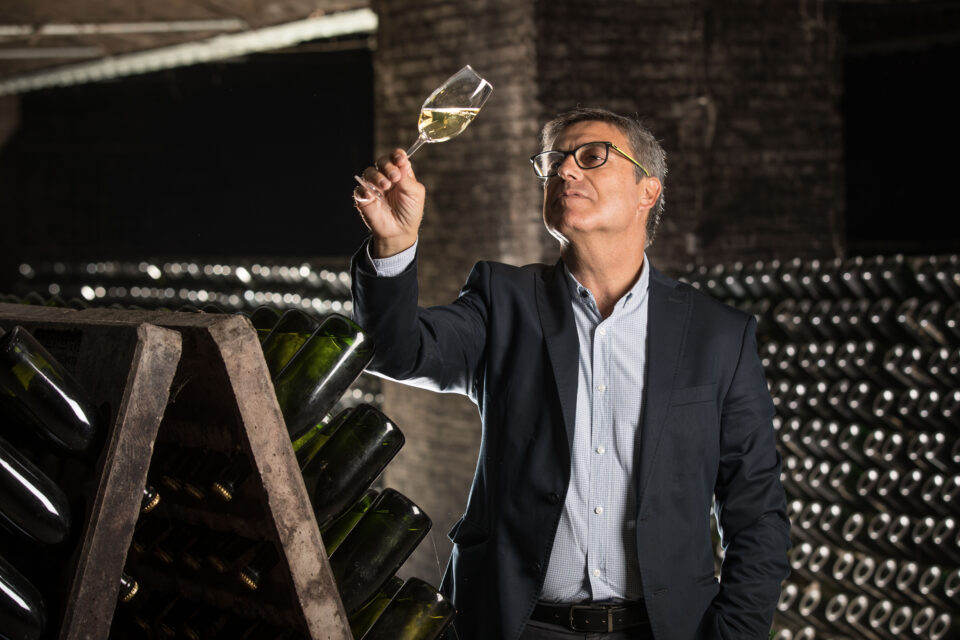Manel Quintana: “Innovation and technology are the secret to produce with the highest quality and food safety”

We make eco the Cupatges interview with Manel Quintana, Head of Oenology at Freixenet Group
Freixenet produces more than 140 million bottles annually, most of them cava, although it has already entered the world of still wines. Exporting most of its production to more than 140 countries, led by Germany, the United States, England, France and Japan.
One of the secrets of this success is innovation and technology, controls and standardization of processes with 18 people working in the quality department and 22 in the oenology department. This work of oenologists and engineers guarantee the highest quality and food safety, connecting innovation and pioneering processes with absolute respect for the traditional method.
Already in the 1970s, the Freixenet Group advanced in the sector by introducing pneumatic presses and the first cold fermentation with controlled temperature in large stainless steel tanks to improve the process in the most delicate phases. In the 1990s, the company began the robotization of its cellars, betting on technological development and the automation of the production process. Since then, much of the winery’s own technology has been exported to the rest of the sector. We spoke with Manel Quintana, head of oenology at the Freixenet Group.
What is a head of enology doing at this time?
Right now our job is to plan the harvest according to our production demands and our sales goals. Now we decide the amount of grapes that we enter and the amount of wine that we will make. We have to see the different moments of maturation of the different varieties and also according to the final product. For Cordón Negro or Carta Nevada, for example, you don’t need the same grapes as the longest-aged Cavas. The aging must be defined already in the vineyard.
But the traditional method of cava, the production method, is it the same for everyone, right?
Yes, we all follow the traditional method, but we believe that the purity of the method has a lot to do with the little human intervention. This minimal intervention in Freixenet means that the consumer, when he buys the bottle and takes it out of the box, is the first person to physically touch that bottle.
How?
Yes, no one has touched 99.99% of the bottles we make before. This remaining 0.01% surely someone has taken them to control some parameter. This is so because we have bet a lot on innovation and technology and to ensure the most rigorous quality control. We intervene with what we can generate value, that is, with decision-making.
There is a widespread belief that robotizing, in this sector, is losing quality and authenticity…
Robotized a closed bottle where the added value is inside the bottle. We want that bottle to have no movement, to be calm; the purity of the method is there. The hand cannot do the same work as a robot and it is not as accurate. For example, the lowering of yeast in the neck of the bottle takes 16 days if it is done manually, and we, thanks to technology, do it in an hour. Does this affect the quality of the product? No. Wine is not manipulated, it is purer than people think, and we have always given priority to physical methods over additives. We also want to play the league of minimal intervention wines; in fact we would surely win prizes!
We have always heard all the wineries say that wine and cava are made in the vineyard…
I agree 95% with the statement. They are made in the vineyard, and in the cellar with the yeasts. Without yeast there is no wine or cava. The uniqueness of the wine the woman the grape, correct, but also the yeast. There are as many yeasts or more than varieties of grapes. For more than 40 years we have been committed to having our own selection yeasts. We have a collection of about 15 yeasts that we isolated and conserved through scientific research and innovation.
And what are the criteria for using one yeast or another?
Produce good fruit, good aromas, little hydrogen sulfide content, etc. We have been cultivating it, so since then the Cavas are always fermented by this yeast of our own selection. In this way, we make sure that the final product always has our mark and that it always has a house brand organoleptic line (color, aromas, mouthfeel…) and that it adapts to the tastes of our consumers.
How is the grape this year? Will there be a good vintage?
The grape is fine at the moment. There is a good harvest with enough quantity. Due to the water that was in the subsoil, the grapes have set well. It remains to be seen how it will evolve in the last days. For it to be beautiful, to make weight and to have juice, it would be very good if it rained a little. We do not have mildew; the pest is very well controlled, with few outbreaks. If it rains a little this late July or the first week of August, that would be great.
Before you told me about exporting knowledge and innovation in the rest of the sector…
We have worked a lot with universities on polyphenols, oxidations, aromas, etc. These jobs come to light, and very often the industry takes advantage of it, something of which we are also very proud. The rhyming and disarm robots, for example, were created here, in Sant Sadurní. It is Freixenet Group’s own technology developed with professionals in the area; in this regard we were pioneers.
